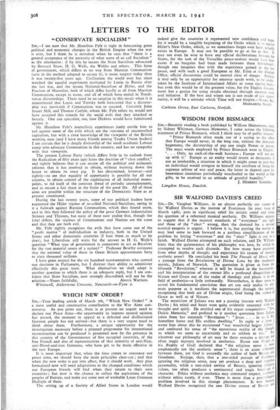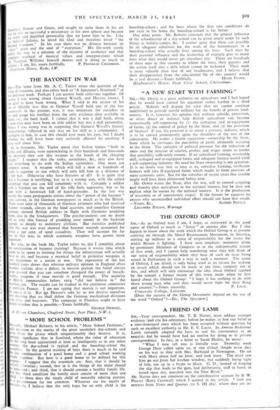SIR WALFORD DAVIES'S CREED
Sta,—Dr. Vaughan Williams, in an almost perfectly cut cameo of Sir Walford Davies as the mentor of Everyman (in your issue of March 14th), puts in significant relief his artistic creed and raises the question of a reformed musical aesthetic. Dr. Williams appears to suggest that if the musical standards of " everyman " are right and those of the " elect " wrong, then the demand for a revised musical exegesis is urgent. I believe it is, but putting the matter so may lead some to look forward to a perilous simplification of the problem by letting " everyman " and the " elect " fight it out to a finish. Walford Davies attempted no such solution, and Dr. Williams hints that the quintessence of his philosophy was love, by which he attempted to resolve such discords. But how many have perceived from what depths of thought and experience his system of musical aesthetic arose? He concluded his book The Pursuit of Music with a passage from the Revelations of Divine Love by the mediaeval mystic, Juliana of Norwich. The quotation is given as from the fifteenth "Revelation," wheredi it will be found in the fourteenth; and his interpretation of the extract lifts a profound disquisition cm Nature and Grace out of the realm of theology and places it in the field of aesthetics—a little awkwardly. Nevertheless, it does serve to reveal his fundamental conviction that art can only realise its ulti- mate purpose as it mediates the supernatural through the natural, recognising that both are of Divine origin, God being the author d Grace as well as of Nature.
The mysticism of Juliana was not a passing interest with Walford Davies ; his mind and heart were quite evidently saturated with her thought and spirit. He entitled one of his organ compositions "Jou Dulcis Memoria," and prefixed to it another quotation from Juliana taken from her sixteenth " Revelation ": " Jesus . . in us is Hit homeliest home and His endless dwelling." In reply to a letter wrote him about this he mentioned "our wonderful helper Juliana," and confessed his sense of " the mysterious reality of the thought to which we seem so uncertainly and so seldom to rise." Bur whatever our philosophy of art may be there remains a strange and often tragic mystery involved in aesthetics. Baron von Hugel (a his Reality of God) declared that "the religious sense is Innst emphatically not the aesthetic sense "; there is an acute difference between them, yet God is assuredly the author of both Beauty and Goodness. Strange, then, that a one-sided pursuit of Goodness, ignoring the religious sense, may yet produce a deep and dignifir" personality, while a one-sided service of Beauty, ignoring religious values, too often produces a sentimental and tragic break-uP , character. Ethics without aesthetics may command respect, aesthe.5cs, without ethics rarely, if ever. There is more than a psychology problem involved in this strange phenomenon. It was beau! Walford Davies recognised the one Divine source of Beauty and Goodness, Nature and Grace, and sought to unite them in his art that he was so successful a missionary in his own sphere and became the noble and dignified personality that we knew him to be. Like his beloved Juliana, he loved his God and therefore loved " the Blessed Common." In his case there was no divorce between an "elect" spirit and the soul of " everyman." His life-work surely points the way to a solution of the mystery of aesthetics • and that aoplete overhaul of musical values and interpretations which Dr. Vaughan Williams himself desires and is doing so much to achieve.—I am, Sir, yours faithfully, P. FRANKLIN CHAMBERS. Grantham House, Ryde, I.W.







































 Previous page
Previous page